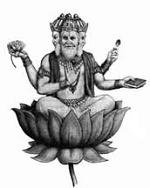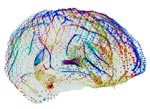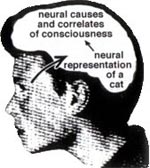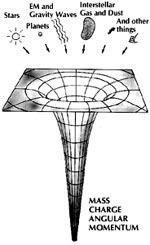Perceiving Infinity:
Schematic Portals into The Mind of God
Monday, May 01, 2006 → by Danieru
 Infinity defies absolute definition. Perception of the infinite, for anything other than a mind which is itself infinitely composed, is an oxymoron. And yet, in historical conceptions of the infinite, or at least the imperceptibly extended, can be found abstract tools by which to better comprehend the very nature of thought, and thus reality itself.
Infinity defies absolute definition. Perception of the infinite, for anything other than a mind which is itself infinitely composed, is an oxymoron. And yet, in historical conceptions of the infinite, or at least the imperceptibly extended, can be found abstract tools by which to better comprehend the very nature of thought, and thus reality itself.The idea of infinity can lead you to grasp the mind of God.
Let me show you:
In Islamic tradition:
When Mahomet was transported to heaven, he says: I saw there an angel, the most gigantic of all created beings. It had 70,000 heads, each had 70,000 faces, each face had 70,000 mouths, each mouth had 70,000 tongues, and each tongue spoke 70,000 languages; all were employed in singing God's praises.
This would make more than 31,000 trillion languages, and nearly five billion mouths. - link
 In Hindu tradition:
In Hindu tradition: A kalpa consists of a period of 1,728,000 solar years called Adi Sandhi, followed by 14 manvantaras and Sandhi Kalas...I find these mythologies fascinating because of the way they manipulate the schema of infinity (or the excruciatingly large) to evoke a sense of awe. What is telling here, and in more familiar concepts such as the omnipotent, omniscient Judaeo-Christian God, is how the human mind absolves itself from ever accessing these infinities whilst at the same time invoking that sense of awe as reason to believe in the infinite:
Thus a day of Brahma, kalpa, is of duration: 4.32 billion solar years.
Two kalpas constitute a day and night of Brahma; the life cycle of Brahma is one hundred years of Brahma, or 311 trillion years. We are currently in the 51st year of the present Brahma and so about 155 trillion years have elapsed since He took over as Brahma. - link
By the name God I understand a substance that is infinite (eternal, immutable,) independent, all-knowing, all-powerful, and by which I myself and everything else, if anything else does exist, have been created. Now all these characteristics are such that the more diligently I attend to them, the less do they appear capable of proceeding from me alone; hence, ... we must conclude that God necessarily exists.
- Rene Descartes, Meditations
 The logical error here rests on the premise that Descartes is capable of attaining access to 'God's perfect form'. The very idea of infinity, or breadth therein contained, is nothing but a schematic simulacrum of the true form of infinity. The mind IS NOT capable of perceiving the infinite, yet I think in conjunction with semiotics a clearer path to infinity can be reached.
The logical error here rests on the premise that Descartes is capable of attaining access to 'God's perfect form'. The very idea of infinity, or breadth therein contained, is nothing but a schematic simulacrum of the true form of infinity. The mind IS NOT capable of perceiving the infinite, yet I think in conjunction with semiotics a clearer path to infinity can be reached.In this perceived moment, itself a composite whole made of an infinite number of infinitesimal components, there is the potential in your consciousness for an infinite number of conciliations to occur. The universe of form is, in mind, schematic and transitory. It is the method by which form is assimilated into mental schema which manifests the universe so true. The infinite universe infinitely schematised:
[An] aspect of consciousness I wish to mention here is modeled upon a behavioral process common to most mammals. It really springs from simple recognition, where a slightly ambiguous perceived object is made to conform to some previously learned schema, an automatic process sometimes called assimilation. We assimilate a new stimulus into our conception or schema about it, even though it is slightly different. Since we never from moment to moment see or hear or touch things in exactly the same way, this process of assimilation into previous experience is going on all the time as we perceive our world. We are putting things together in recognizable objects on the basis of the previously learned schemes we have of them...
- Julian Jaynes, The Origin of Consciousness...
 In this conception of consciously formed reality finite limits on the nature of our schema halt the further assimilation of external stimulus. Thus all subjective representations of the objective universe can only ever go part of the way to attaining a true tautology of semblance. In a universe of varying types of consciousness, as evolved in the various central nervous systems on this planet, this problem of semblance can be some way overcome. Distinct consciousnesses will form different schema to represent the same stimulus. The universe is better realised in many consciousnesses, of which perhaps an infinite variety have the capacity to exist:
In this conception of consciously formed reality finite limits on the nature of our schema halt the further assimilation of external stimulus. Thus all subjective representations of the objective universe can only ever go part of the way to attaining a true tautology of semblance. In a universe of varying types of consciousness, as evolved in the various central nervous systems on this planet, this problem of semblance can be some way overcome. Distinct consciousnesses will form different schema to represent the same stimulus. The universe is better realised in many consciousnesses, of which perhaps an infinite variety have the capacity to exist:Consciousness is "a holistic emergent property of the interaction of neurons which has the power to be self-reflective and ascertain its own awareness"I am still left wondering about true infinity, at least that which consciousness can attain. What would be the nature of a stimulus which had the capacity to assimilate an endless variety of schema? Or alternatively, is there such thing as a mental construct, a concept, which has no limit to the stimulus it can assimilate? Perhaps the mind of God is capable in its imagined brevity to perceive every objective truth from an infinity of angles. In fact, this need necessarily be the case for any infinitely capable being, such as God. To this kind of consciousness even the proverbial dog shit you carry around on your shoes has an infinite number of ways it can be perceived.
- Max Velmans, Understanding Consciousness
 Further still, I was lead into thought on matters of entropy (not least because of a recent post to the forum). The black-hole is nature's favourite point of infinity. All data in the universe, once subsumed by the awesome gravity of the black-hole, would come to be represented at a singular point of infinitesimal breadth; a singularity. The mind of God may be such an entity, for in its infinite density of assimilative capacity the only form it could take is that of a singularity.
Further still, I was lead into thought on matters of entropy (not least because of a recent post to the forum). The black-hole is nature's favourite point of infinity. All data in the universe, once subsumed by the awesome gravity of the black-hole, would come to be represented at a singular point of infinitesimal breadth; a singularity. The mind of God may be such an entity, for in its infinite density of assimilative capacity the only form it could take is that of a singularity.Not only is a black-hole, and now perhaps the mind of God, a singularity of infinite density, so too was the very universe we now reside in at the momentary point when nothing became everything: the big-bang:
If the singularity at the centre of a black hole lies in the future, representing a final state, the singularity of a white hole lies in the past, as a beginning, as in the big bang. So if our universe is a white hole, the big question is: is there a black hole universe on the other side of the big bang?Or perhaps (to assimilate both mine and Kaku's concepts into one, infinitely schematised entity) the mind of God itself exists on the other side of this universe. A mind so dense in assimilatory power that all concepts, all datum, all matter and entropically governed consciousness converge at a point only to be spewed majesically out the other side, into this reality.
- Mikio Kaku, Parallel Worlds
The conscious mind is a schematic canvas on which subjective reality is being painted by the infinite, yet unattainable, idea of God. The cyclical power of assimilation, of consciousness, or self-reflexion should not be overlooked, because in the evolved mind of all conscious beings everywhere the idea of infinity, and the God-Simulacrum therein made prisoner, reorders reality such that it can reflect upon itself. Infinity is coming to perceive itself through us. All minds are infinite, my schema tell me so...
See also:
- Excruciatingly Large Forum
- Pi Transcendence, Conscious Assimilation and the Quest for the Ultimate Metaphor
- Art, Technology and the Progressive Hand of Human Imagination
Categories: Science, Reality, Consciousness, Maths, Ideas, God, Simulacrum, History, Language, Human, Evolution, Universe, Religion, Perception, Physics, Singularity, Books, Islam, Quotes, Philosophy
|
|

 Links
Links Subscribe via RSS!
Subscribe via RSS!


 Via Email
Via Email


May 02, 2006 12:11 AM
May 03, 2006 11:38 AM
thank you for the insightful looks into the nature of infinity.
May 03, 2006 8:09 PM
May 04, 2006 9:38 AM
I suppose I didn't make my stance on the concept of 'God' very clear here. I use the term in a referential sense, not to appeal to the culturally aquired ideal of a religious figure head, but more as a starting point from which to better comprehend infinity from. (If you glance over the rest of my blog you'll soon discover my position on religion of all kinds).
The all supersceding entity of God, were it to exist, would be as close to a singularity, or indeed a black-hole/white-hole boundary, as any formalised infinity could be.
I'd love to see someone attempt to slot that kind of God into their chosen religious doctrine / faith governed reality.
May 04, 2006 12:15 PM
And yes, I see it as an entity, or the entity, or myself depending on the perspective, that I can somehow relate to. Playing the God-game is very useful for exploring your relation with reality, in the psychological sense more than just the theororetical sense I guess, but of course in both ways really. To me, this is not the same thing as mindlessly repeating dogma which is what goes for spirituality in most cases...
May 04, 2006 5:38 PM
The only entity that can perceive the universe in its entirety is the universe (which is less than infinite). Even if you account for every bit of data generated since the first Plank quanta of time, observed from every time space co-ordinate on a Plank scale, the number is not infinity.
The nature of our universe does not allow infinity to exist (except when you start dividing thing by zero) so don’t feel badly if you never comprehend infinity, The universe doesn’t either.
May 05, 2006 5:42 AM
"abstract tools by which to better comprehend the very nature of thought"
and this:
"how the human mind absolves itself from ever accessing these infinities whilst at the same time invoking that sense of awe as reason to believe in the infinite"
If I really try and think about what infinity means for each individual's reality or in the examples you've given from religions and others that happen to come to mind (anecdotes of the number of stars, the size of heaven, etc.), it becomes very difficult to discern the difference between how we perceive abstracted forms of infinity and even just large tangible quantities.
how many simultaneous things can the human mind trully perceive or believe in?
if the purpose of infinity is to invoke a sense of awe in religion and is equally as unobtainable as in its scientific realms, then is infinity merely a slipping grasp on that which is beyond our scale of reality?
we can neither feel the connections between thousands of ants in a colony nor sense the immensity of the gravitational pulls between every star in existence... now even human interactions are operating on scales too great to imagine (internet, population, economy).
So, if the purpose of infinity (or the ultimate result) is to invoke awe, then why promote a lack of understanding? Is just the feeling of mental overdrive enough to reach the divine? the rules of particle dynamics?
hmmmmmmm.
May 08, 2006 3:08 PM
Isn't it supposed to be about 5 or 6?
I remember seeing an experiment done with chimps where they would flash up a series of objects at different speeds. The number of objects could be altered and if the chimp picked the right number of objects before they flashed off again they got a sweety as treat.
Chimps could perform well at this task up until the number of objects exceeded something like 8 / 9. Humans on the other hand, when the task was repeated, performed less well on the higher numbers than the chimps (although much better on the lower figures).
Human brains DOWN evolved from chimps to accomodate less objects in their mental space.
More is not necessarily better...
(I need to find this experiment. I just posted a question to AskMeFi on the topic, more info there...)
May 09, 2006 8:18 AM
I'm thinking more in an abstract sense, since short-term memory and multi-tasking deal mainly with real-world scenarios. I don't think we're really capable of physically exemplifying every simultaneous impulse or thought we have. In a way, for example, memories could be considered a sort of exceptionally large reservoir of information that seems infinite but that we are able to access all the time. We can feel comfortable imagining the seemingly endless stream of memories without usually invoking a sense of awe. We feel them confined to a certain context of time or situation or whatever, and although we really couldn't make definitive boundaries between one and the next (or the real and dreamed), there is a knowing sense that they exist.
Perhaps that isn't really infinity, since it is without the 'unknown' and 'awe-inspiring' factors. I wonder at what point our minds classify a situation or abstract concept as 'beyond.' Mystification perhaps has its own perameters. Or maybe it's just a lack of focus and concentration that invokes awe in the first place. Ponderings on a dull Thursday, good times :)
May 11, 2006 3:19 AM
I have also mentioned an amazing book (which I actually have a copy of in Japan should you want to borrow it) The Mind of a Mnemonist:
Solomon Shereshevskii had a memory so perfect that he could recall every minute of his life in graphic detail. This fantastic capacity was further distinguished by the fact that he could “feel” images, “taste” colours, and “smell” sounds. - link to brief outline - link to book on Amazon
What the book goes on to outline is the way in which this unfiltered access to reality appeared for Solomon to blur the lines between the real and the imaginary beyond recognition.
All his world (past/present/future) was painting inside his mind as pictures, images and landscapes he could mentally 'walk through' to access his memories, his knowledge etc. This had advantages. Say he wanted to remember a piece of information. He might walk through his mind and place a symbol of that information at a specific point in his landscape, where later he could traverse back and find it. The symbolism of this is easy to grasp, but for Solomon it was not quite so fantastical. Say for instance that he had placed that symbol of info in the shadows along a street in his mind, when he returned again to find it the shadows may literally block his view of the item, and thus his memory would appear to be missing something!
I suppose I think our infinite capacities are like this, though less literally. Our mind maps itself onto itself in so much complexity that if we were to traverse the landscapes of our life, much as the way Solomon did, memories long since 'lost' in the 'shadows' of our consciousness would emerge as if reborn.
The mind may not truly be infinite, but then neither is the English language, yet with the tools of words, sentences and syntax an infinite variety of meaning CAN be created.
Perhaps our mind is like a complicated city full of hidden doorways, backalleys and gloomy shadows. The city is finite, but the ways in which a consciousness can explore that city are endless. If that's not awe inspiring I don't know what is.
May 11, 2006 5:48 AM
May 11, 2006 2:23 PM
The mystics and enlightened people in history always knew that the answer was in the number 0. Infinity starts and meets back at 0. So in a micro scale you have atoms, which if you go smaller, you have nuetrinos, quarks, glicks, etc. On the macro side you have our universe, and beyond that lies an even bigger space, which beyond that lies an even bigger space. Well, the final theory of everything states that eventually the micor meets the macro. So lets say 1 person is capable of breaking down further into atoms and another person is capapble of going further out into space, eventually the two will meet at the beginning of where the other started. This is something that dogmatically influenced spiritualists knew naturally. Of course once a person reaches enlightenment, they can easily ditinguish between what is and what isn't dogma. Your hatred towards it won't allow you to grasp deeper knowledge, then again isn't it supposed to be that way?
July 06, 2006 12:51 AM
January 30, 2007 6:32 PM
God is everything, not nothing.
It is starts as one, and ends as one.
For nine years I thought about the meaning of life during those periods when I had time to kill: sitting on the bus, waiting in line, brushing my teeth, etc.
I then discovered the key was understanding infinity.
So once when I had a two week vacation, I decided to think solely about the definition of infinity. Stupidly, I didn't think that as a being with a finite mind I couldn't understand infinity. As I came closer and closer to realizing infinity, I became aware that I was losing touch with reality, and what was even scarier was that it felt pleasant to let go of reality and move towards the knowledge of infinity. I decided that I liked being sane and so I stopped trying to attain true knowledge of infinity. The one thing I brought back from the verge of "insanity" was that somehow the answer to infinity was closely linked to the number ONE. If you think about it enough, you will see also.
April 13, 2007 1:53 AM
December 16, 2007 6:16 AM
April 14, 2008 2:40 PM
February 18, 2009 11:55 PM
Post a Comment